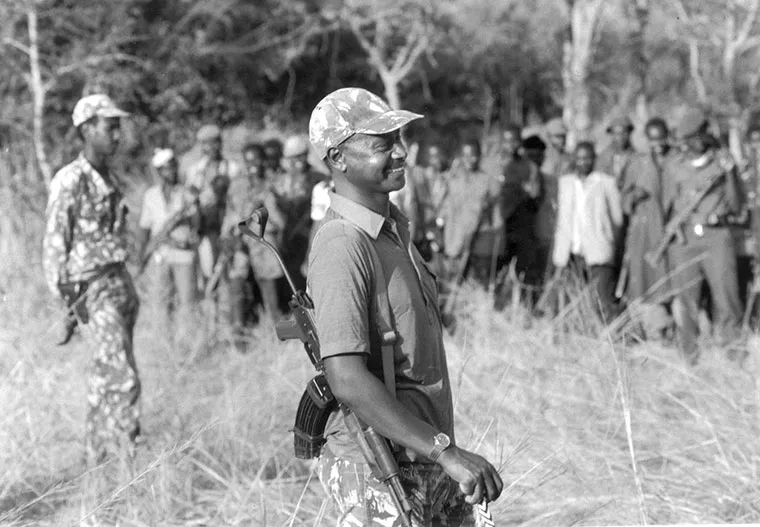The Unanswered Crimes of Musevenism
- Kizito Enock
- Oct 11, 2025
- 4 min read

A Legacy of War, Silence, and Repression in East Africa
By Kizito Enock
On January 29, 1986, Yoweri Kaguta Museveni seized power in Uganda after a bloody six-year civil war, known as the Bush War. The conflict, fought between 1980 and 1986, left Uganda physically devastated and emotionally fractured. More than 50% of Ugandans lost family members, and 67% of the population witnessed violence, including killings, abductions, and sexual atrocities.
Museveni’s National Resistance Army (NRA) waged war not just on its enemies, but on civilians. It recruited child soldiers, known as "kadogos", and committed grave human rights violations. Women were raped. Men were sodomized. Communities were left terrorized. These were acts of war crimes as defined under the Geneva Conventions and international humanitarian law and yet, no one has ever been held accountable.
This violence was not random. It was a strategy a calculated method of psychological warfare designed to break identities and shatter resistance. As Philipp Schulz writes in Male Survivors of Wartime Sexual Violence, these acts eroded survivors’ sense of masculinity, humanity, and belonging. The NRA didn’t just defeat an army they crushed the soul of a nation.
Museveni has never answered for these crimes. Instead, he consolidated power, rewrote history, and rebuilt his image as a liberator. Today, he rules through a blend of military loyalty, patronage, election rigging, and ruthless suppression of dissent.Museveni's refusal to relinquish power is not just political ambition it is fear of accountability. To step down would be to open the door to the reckoning he has evaded since 1986. To stay in power is to keep the silence intact. But this silence has grown louder across borders.
In 2024, Ugandan journalist Agatha Atuhaire and Kenyan activist Boniface Mwangi were abducted and tortured by Tanzanian security forces. Reports allege that they were beaten and sexually humiliated before being dumped across their respective borders. The tactics used were hauntingly familiar: torture, isolation, and sodomy echoes of the NRA’s original blueprint.
Musevenism: The Virus That Spreading...
What we are witnessing is not just repression it is Musevenism: a political virus that has spread across East Africa. It thrives on impunity, militarism, and a culture of normalized violence. It infects every regime that chooses coercion over consensus, intimidation over dialogue, brutality over justice.
In Uganda, opposition leader Kizza Besigye has been imprisoned multiple times for daring to challenge Museveni. His most recent arrest, abducted from Kenya and turned up held in Uganda's military court and later prison, mirrors the tactics once used against NRA suspects except now, they’re used on political rivals.
Sam Mugumya, an ally of Besigye, disappeared in August 2025. His family and supporters still search for answers.
In Tanzania, opposition figures Freeman Mbowe and Tundu Lissu have both faced fabricated charges and assassination attempts. Lissu was charged with treason in April 2025, years after surviving a near-fatal shooting.
In Kenya, citizens who speak out are not safe either. Activists ? Humfrey Polepole a former Ambassador , Bob Njagi and Nicholas Oyoo were reportedly abducted while on their visit in Uganda and remain missing.
This regional copy-paste of repression is not a coincidence it is the logical export of Museveni’s unchecked impunity.
It is particularly cruel that while Museveni’s regime criminalizes homosexuality, his own forces have historically used sodomy as a weapon of war. This hypocrisy is not just moral it’s strategic. It shields perpetrators and diverts public outrage toward scapegoats while hiding the true crimes of the state.
As revealed in the 2009 documentary Gender Against Men, and echoed in Schulz’s academic work, male victims of wartime sexual violence remain invisible, unheard, and unacknowledged. Their pain, like that of their communities, has been buried under political convenience.
Musevenism is not just a Ugandan problem it is an East African threat. It is a legacy of unaddressed crimes, unhealed trauma, and unending impunity. It infects parliaments, prisons, police stations, and presidential palaces.
To defeat Musevenism, we must do what no court has yet done: name the crimes. We must remember the "kadogos" who never returned home. The men sodomized in silence. The women raped and discarded. The families shattered, the voices erased.
We must demand justice not just for political prisoners, but for survivors of war crimes and sexual violence whose pain has been ignored for nearly four decades.
If we continue to let Musevenism metastasize, we risk raising a generation that believes power is meant to be taken by force and held by fear. We risk normalizing the abnormal. We risk losing the soul of our region. But if we confront it if we name it we begin to heal.
We are not just fighting a man. We are fighting the myth of his untouchability. And in that fight, truth is our first weapon. Justice delayed is justice denied. But truth delayed is history rewritten. And we will not allow that.
To the disappeared, the tortured, the broken, the silenced and the lives we’ve lost along the way your pain echoes in us, your memory lives through us, and your story will never be forgotten. ✍🏽











Comments